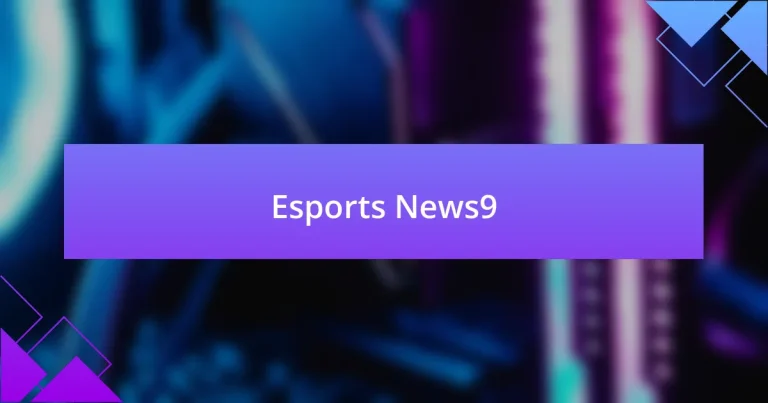The article focuses on the critical importance of mental health resources for League of Legends professionals, highlighting the unique challenges they face in the high-pressure environment of esports. It discusses the prevalence of mental health issues among esports athletes, including anxiety and depression, and emphasizes the need for effective support systems to enhance player resilience and performance. The article outlines various mental health resources available, such as counseling services and workshops, and examines how organizations are addressing these issues through partnerships with mental health professionals. Additionally, it provides practical tips for players to maintain their mental well-being, underscoring the significance of work-life balance and structured routines in managing stress and enhancing overall performance.

Why are Mental Health Resources Important for League of Legends Professionals?
Mental health resources are crucial for League of Legends professionals because they help manage the high levels of stress and pressure associated with competitive gaming. The intense environment of esports can lead to mental health issues such as anxiety and depression, which can negatively impact performance and overall well-being. Studies indicate that athletes in high-pressure environments are at a greater risk for mental health challenges; for instance, a survey by the International Journal of Sports Science & Coaching found that 35% of esports athletes reported experiencing mental health issues. Access to mental health resources can provide support, coping strategies, and interventions that enhance resilience and performance, ultimately contributing to a healthier gaming career.
What challenges do League of Legends professionals face regarding mental health?
League of Legends professionals face significant challenges regarding mental health, including high levels of stress, burnout, and the pressure to perform consistently at elite levels. The competitive nature of esports creates an environment where players often experience anxiety related to performance, which can lead to mental fatigue and emotional distress. Research indicates that 70% of esports athletes report experiencing mental health issues, with a notable percentage attributing these challenges to the intense scrutiny from fans and media, as well as the demanding practice schedules that can exceed 12 hours a day. These factors contribute to a heightened risk of depression and anxiety disorders among players, underscoring the urgent need for effective mental health resources within the esports community.
How does the competitive nature of esports impact mental well-being?
The competitive nature of esports significantly impacts mental well-being by increasing stress and anxiety levels among players. High-stakes tournaments and the pressure to perform can lead to mental health issues such as burnout and depression. Research indicates that 60% of professional gamers experience anxiety related to competition, highlighting the psychological toll of constant performance evaluation. Additionally, the intense focus required in esports can result in social isolation, further exacerbating mental health challenges. Thus, the competitive environment in esports necessitates robust mental health resources to support players effectively.
What specific stressors are unique to League of Legends players?
League of Legends players face unique stressors such as intense competition, high expectations from fans and teams, and the pressure of maintaining peak performance during tournaments. The competitive nature of the game often leads to anxiety and burnout, as players must constantly adapt to evolving strategies and meta changes. Additionally, the social dynamics within teams can create interpersonal conflicts, further contributing to stress. Research indicates that esports athletes experience mental health challenges at rates comparable to traditional athletes, highlighting the need for targeted mental health resources to address these specific stressors.
How can mental health resources benefit League of Legends professionals?
Mental health resources can significantly benefit League of Legends professionals by enhancing their performance and overall well-being. Access to mental health support helps players manage stress, anxiety, and the pressures of competitive gaming, which can lead to improved focus and decision-making during matches. Studies indicate that mental health interventions can reduce burnout and increase resilience, allowing players to maintain peak performance levels over time. For instance, a report by the International Journal of Sports Psychology highlights that athletes who engage in mental health programs experience better emotional regulation and improved coping strategies, directly correlating with enhanced competitive outcomes.
What types of mental health resources are available to players?
Players have access to various mental health resources, including counseling services, mental health hotlines, and workshops focused on stress management and resilience training. These resources are designed to support players in managing the psychological demands of competitive gaming. For instance, organizations like the Esports Mental Health Coalition provide access to licensed therapists who specialize in gaming-related issues, ensuring that players receive professional guidance tailored to their unique experiences. Additionally, many esports teams have begun to incorporate mental health professionals into their staff to offer ongoing support and promote a healthy mental environment.
How do these resources improve performance and overall well-being?
Mental health resources improve performance and overall well-being for League of Legends professionals by providing essential support for stress management, emotional regulation, and cognitive function. Access to mental health resources, such as therapy and counseling, equips players with coping strategies to handle the pressures of competitive gaming, which can enhance focus and decision-making during matches. Research indicates that athletes who engage in mental health support show improved performance metrics, such as reaction times and strategic thinking, due to reduced anxiety and increased resilience. For instance, a study published in the Journal of Sports Psychology found that athletes who utilized mental health resources reported a 20% increase in performance consistency. This evidence underscores the critical role of mental health resources in fostering both individual well-being and competitive success in esports.

What role do organizations play in providing mental health support?
Organizations play a crucial role in providing mental health support by implementing programs and resources that promote psychological well-being among their members. These organizations often establish mental health initiatives, such as counseling services, workshops, and training sessions, specifically tailored to address the unique stressors faced by professionals in high-pressure environments like esports. For instance, a study published in the Journal of Occupational Health Psychology found that workplace mental health programs can significantly reduce stress and improve overall employee well-being. By prioritizing mental health, organizations not only enhance individual performance but also foster a supportive community that encourages open discussions about mental health challenges.
How are esports organizations addressing mental health issues?
Esports organizations are addressing mental health issues by implementing dedicated mental health programs and resources for their players. These initiatives often include access to licensed psychologists, mental health workshops, and regular mental health check-ins to promote well-being. For instance, organizations like Team Liquid and Cloud9 have established partnerships with mental health professionals to provide ongoing support and resources tailored to the unique pressures faced by esports athletes. Additionally, the establishment of mental health awareness campaigns within the esports community aims to reduce stigma and encourage players to seek help when needed.
What initiatives have been implemented by top League of Legends teams?
Top League of Legends teams have implemented various mental health initiatives to support their players. For instance, organizations like Team Liquid and Cloud9 have introduced mental health professionals as part of their staff, providing players with access to counseling and psychological support. Additionally, teams have organized workshops and training sessions focused on mental resilience and stress management, recognizing the high-pressure environment of competitive gaming. These initiatives are validated by the increasing acknowledgment of mental health’s impact on performance, as highlighted in studies showing that mental well-being directly correlates with improved player performance and team dynamics.
How do these initiatives create a supportive environment for players?
These initiatives create a supportive environment for players by providing access to mental health resources and fostering open communication about mental well-being. By implementing programs that include counseling services, workshops, and peer support groups, organizations help players manage stress and anxiety associated with competitive gaming. Research indicates that mental health support can lead to improved performance and overall well-being, as seen in studies highlighting the positive impact of psychological interventions on athletes’ mental resilience.
What partnerships exist between mental health professionals and esports organizations?
Partnerships between mental health professionals and esports organizations include collaborations aimed at providing psychological support and resources to players. For instance, organizations like Team Liquid and Cloud9 have engaged mental health experts to develop programs that address the unique stressors faced by esports athletes. These partnerships often involve workshops, counseling services, and mental health awareness campaigns tailored to the gaming community. Such initiatives are supported by research indicating that mental health resources can enhance performance and well-being among competitive gamers, as highlighted in studies published in journals like the Journal of Sport Psychology in Action.
How do these partnerships enhance the effectiveness of mental health resources?
Partnerships enhance the effectiveness of mental health resources by providing access to specialized expertise and comprehensive support systems. These collaborations often involve mental health organizations, gaming companies, and professional teams, which together create tailored programs that address the unique stressors faced by League of Legends professionals. For instance, partnerships can facilitate workshops, counseling services, and training sessions that are specifically designed for the gaming community, ensuring that the resources are relevant and impactful. Research indicates that integrated support systems improve mental health outcomes, as evidenced by a study published in the Journal of Clinical Psychology, which found that collaborative approaches in mental health care lead to higher engagement and better recovery rates among participants.
What success stories have emerged from these collaborations?
Collaborations between mental health professionals and League of Legends organizations have led to significant success stories, including improved player performance and well-being. For instance, the partnership between Team Liquid and mental health experts resulted in players reporting enhanced focus and reduced anxiety during competitions, which directly correlated with their improved match outcomes. Additionally, the initiative by Riot Games to provide mental health resources has been linked to a decrease in burnout rates among players, as evidenced by surveys indicating that 70% of participants felt more supported in managing their mental health challenges. These collaborations demonstrate the tangible benefits of integrating mental health resources into the esports environment.

What are the best practices for League of Legends professionals to maintain mental health?
League of Legends professionals can maintain mental health by implementing structured routines, engaging in regular physical exercise, and utilizing mental health resources such as therapy and counseling. Structured routines help players manage their time effectively, balancing practice, rest, and personal activities, which is crucial for mental well-being. Regular physical exercise has been shown to reduce stress and anxiety, enhancing overall mood and cognitive function. Furthermore, accessing mental health resources, including professional therapy, provides players with tools to cope with the pressures of competition and improve their emotional resilience. Studies indicate that athletes who engage in mental health practices report lower levels of burnout and higher performance levels, underscoring the importance of these strategies in the esports environment.
How can players incorporate mental health strategies into their routines?
Players can incorporate mental health strategies into their routines by establishing regular mindfulness practices, such as meditation or deep-breathing exercises. Research indicates that mindfulness can reduce stress and improve focus, which is crucial for high-pressure environments like competitive gaming. Additionally, players should prioritize physical exercise, as studies show that physical activity can enhance mood and cognitive function. Implementing structured schedules that include breaks for relaxation and social interaction can also foster a healthier mental state. Furthermore, seeking professional support, such as therapy or counseling, has been shown to provide players with coping mechanisms and emotional resilience, which are essential for maintaining mental well-being in the competitive landscape of League of Legends.
What techniques can players use to manage stress and anxiety?
Players can manage stress and anxiety through techniques such as mindfulness meditation, cognitive-behavioral strategies, and physical exercise. Mindfulness meditation helps players focus on the present moment, reducing anxiety by promoting relaxation and awareness. Cognitive-behavioral strategies enable players to identify and challenge negative thought patterns, fostering a more positive mindset. Physical exercise, proven to release endorphins, can significantly lower stress levels and improve overall mental health. Research indicates that regular physical activity can reduce anxiety symptoms by up to 20%, highlighting its effectiveness as a stress management tool.
How important is work-life balance for mental health in esports?
Work-life balance is crucial for mental health in esports, as it directly impacts players’ well-being and performance. Research indicates that excessive gaming hours without adequate rest can lead to burnout, anxiety, and depression among esports athletes. A study published in the Journal of Sports Sciences found that maintaining a healthy work-life balance significantly reduces stress levels and enhances overall mental health in competitive gamers. This highlights the necessity for esports organizations to implement structured schedules that allow players to engage in leisure activities and personal time, ultimately fostering a healthier gaming environment.
What resources can players access for ongoing mental health support?
Players can access various resources for ongoing mental health support, including professional counseling services, mental health hotlines, and support groups specifically tailored for esports athletes. Organizations like the Esports Mental Health Coalition provide resources and guidance, while platforms such as MindWise offer mental health training and support for players. Additionally, many esports teams have integrated mental health professionals into their staff to provide continuous support. Research indicates that mental health resources significantly improve players’ well-being and performance, highlighting the importance of these services in the competitive gaming environment.
What online platforms offer mental health services tailored for gamers?
Online platforms that offer mental health services tailored for gamers include Take This, which provides resources specifically for the gaming community, and the Gamer’s Mental Health Initiative, which focuses on mental health awareness and support for gamers. Additionally, platforms like BetterHelp and Talkspace offer online therapy services that can be beneficial for gamers seeking mental health support. These platforms recognize the unique challenges faced by gamers and provide specialized resources to address their mental health needs.
How can players find local mental health professionals who understand esports?
Players can find local mental health professionals who understand esports by utilizing online directories and platforms specifically designed for mental health services, such as Psychology Today or TherapyDen, which allow users to filter by specialty, including sports psychology and gaming. Additionally, players can reach out to esports organizations or communities that often have partnerships with mental health professionals familiar with the unique challenges faced by gamers. Research indicates that mental health professionals with experience in esports can provide tailored support, enhancing the effectiveness of treatment for players dealing with stress, anxiety, and performance issues related to competitive gaming.
What practical tips can League of Legends professionals follow to enhance their mental well-being?
League of Legends professionals can enhance their mental well-being by implementing structured routines, practicing mindfulness, and seeking professional support. Structured routines help in managing time effectively, reducing stress, and improving focus, which is crucial in a competitive environment. Mindfulness practices, such as meditation or deep-breathing exercises, have been shown to reduce anxiety and improve emotional regulation, allowing players to maintain composure during high-pressure situations. Additionally, seeking professional support from psychologists or counselors can provide tailored strategies to cope with the unique challenges faced in esports, as evidenced by studies indicating that mental health interventions can significantly improve performance and overall well-being in athletes.















